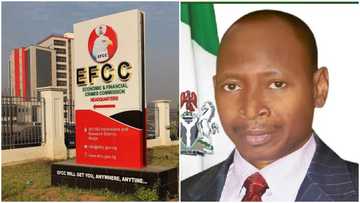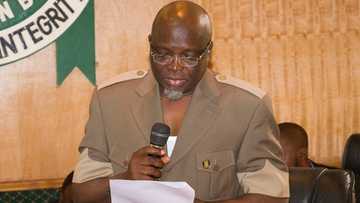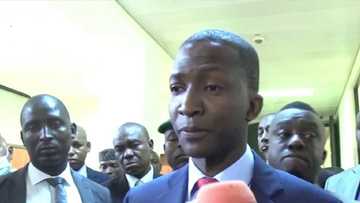EFCC: The Inspiration Behind the Nigerian Agency Causing Headaches for Corrupt Folks
- In September 2006 alone, 31 out of 36 Nigerian state governors were under investigation for charges of corruption
- Since its formation in the year 2003, the Economic and Financial Crimes Commission (EFCC) has been the headache of internet fraudsters and corrupt persons in the country
- The anti-graft agency now led by Abdulrasheed Bawa recovered over $121m in 2022 alone, amongst other commendable exploits
19 years after its formation, the Economic and Financial Crimes Commission (EFCC) has continued to 'put sand in the garri' of corrupt bank chief executives, internet fraudsters as well as bad public office holders.
This article is a tell-it-all on the Genesis, progress and current achievements of Nigeria's anti-graft agency.
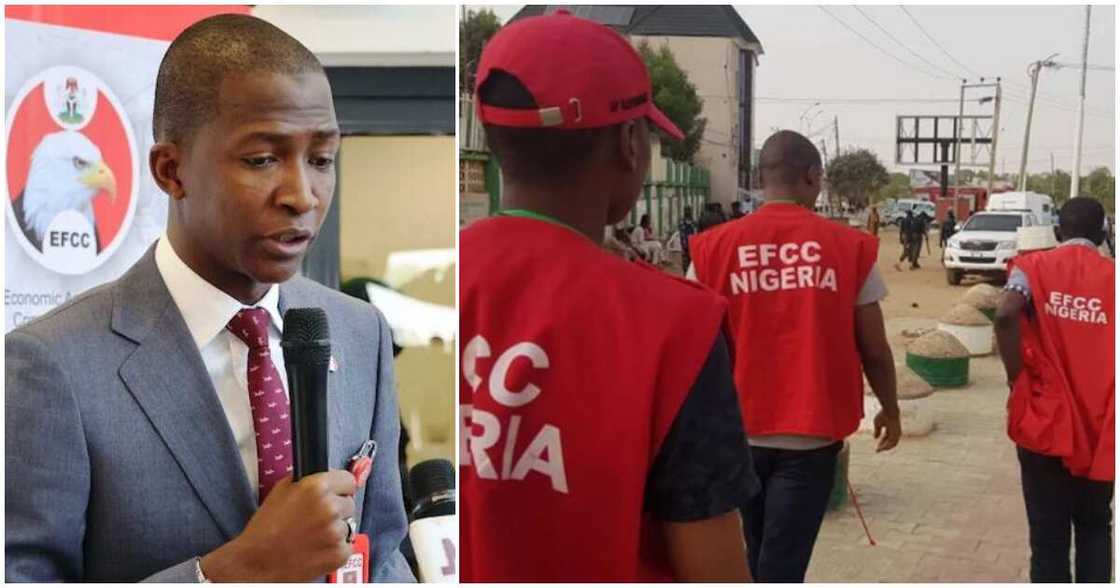
Source: UGC
The History of EFCC
In a partial response to the pressure mounted on Nigeria's leadership by the Financial Action Task Force on Money Laundering (FATF), the EFCC was birthed.
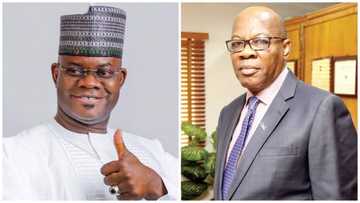
Read also
Top lawyer issues strong allegation against EFCC over 'harassment' of Governor Yahaya Bello
PAY ATTENTION: Follow us on Instagram - get the most important news directly in your favourite app!
According to Nigerian Finder, FATF, an intergovernmental organisation founded by the G7 in 1989 to tackle money laundering, named Nigeria as one of 23 countries non-cooperative in the international community's efforts to fight money laundering.
So, on April, 2003, EFCC was established with Nuhu Ribadu becoming its first-ever chairman. Under Ribadu's leadership, significant prosecutions and convictions, notably that of Diepreye Alamieyeseigha.
Diepreye Alamieyeseigha is a former Bayelsa state governor who faced charges of money laundering by the anti-graft agency and was consequently impeached on corruption allegations on December 9, 2005.
The commission's website contains a list of Nigeria's most wanted criminals, prosecutions as well as suspects.
Establishment Act of the EFCC
It is noteworthy that the EFCC was also established by the government in its bid to eradicate fraudulent practices among Nigerians and includes vices such as mismanagement of public funds and advance fee fraud (419 fraud).
Nigerian Finder reports that In 2002, the EFCC Establishment Act was first enacted and later amended in the year 2004.
Section 7(2) of the Establishment Act 2004 states that the EFCC is saddled with the responsibility of enforcing provisions of the law relating to economic and financial crimes.
They include the Miscellaneous Offences Act, 1985; Terrorism Act, 2011; The Banks and Other Financial Institutions Act, 1991; The Money Laundering Act of 1995 amongst others.
EFCC logo, mission and vision statements
The Commission's logo is an eagle with the country's coat of arms above it, both on a red background.
The eagle represents strength, vigilance and tenacity while the coat of arms stands for the nation's sovereignty and the red colour signifies vigour and non-tolerance of corrupt practice.
On its official website, its vision statement reads:
"A Nigeria free of economic and financial crimes."
The anti-graft agency's mission statement goes thus:
"To eradicate economic and financial crimes through prevention, enforcement and coordination."
2022 achievements of the EFCC
As of December 9, 2022, the EFCC has secured 3615 convictions since January 1. This was revealed by the commission chairman, Abdulrasheed Bawa, at a media briefing organised by the presidential communications team in Abuja on Thursday, December 15.
The agency has also recovered over $121m.
“In terms of monetary recoveries for the year under review, from January 1st to October 31st, 2022, we recovered N134,337,759,574
“We have equally recovered $121 million as well as different amounts of pound sterling, euro, Japanese yen, among others.
“For the non-cash assets, these are some of the recoveries that we have made: 52 automobiles, electronics, motorcycles, clothing and real estates. These are forfeited assets, not cases that are under investigation,” a statement credited to him as published by The Cable reads.
EFCC makes stunning revelations about Nigerian politicians
Meanwhile, Legit.ng previously reported that the EFCC had dropped a bombshell about actors on the Nigerian political scene.
In the build-up to the 2023 general elections, the Economic and Financial Crimes Commission said it had commenced an investigation on some top politicians.
The commission’s chairman, Abdulrasheed Bawa, disclosed this in Lagos on Tuesday, October 25, at a workshop on financial crimes reportage organised for some selected journalists.
He listed some of them as top politicians, legal practitioners, estate operators, precious stone dealers, accountants, construction companies, and many others.
Source: Legit.ng


